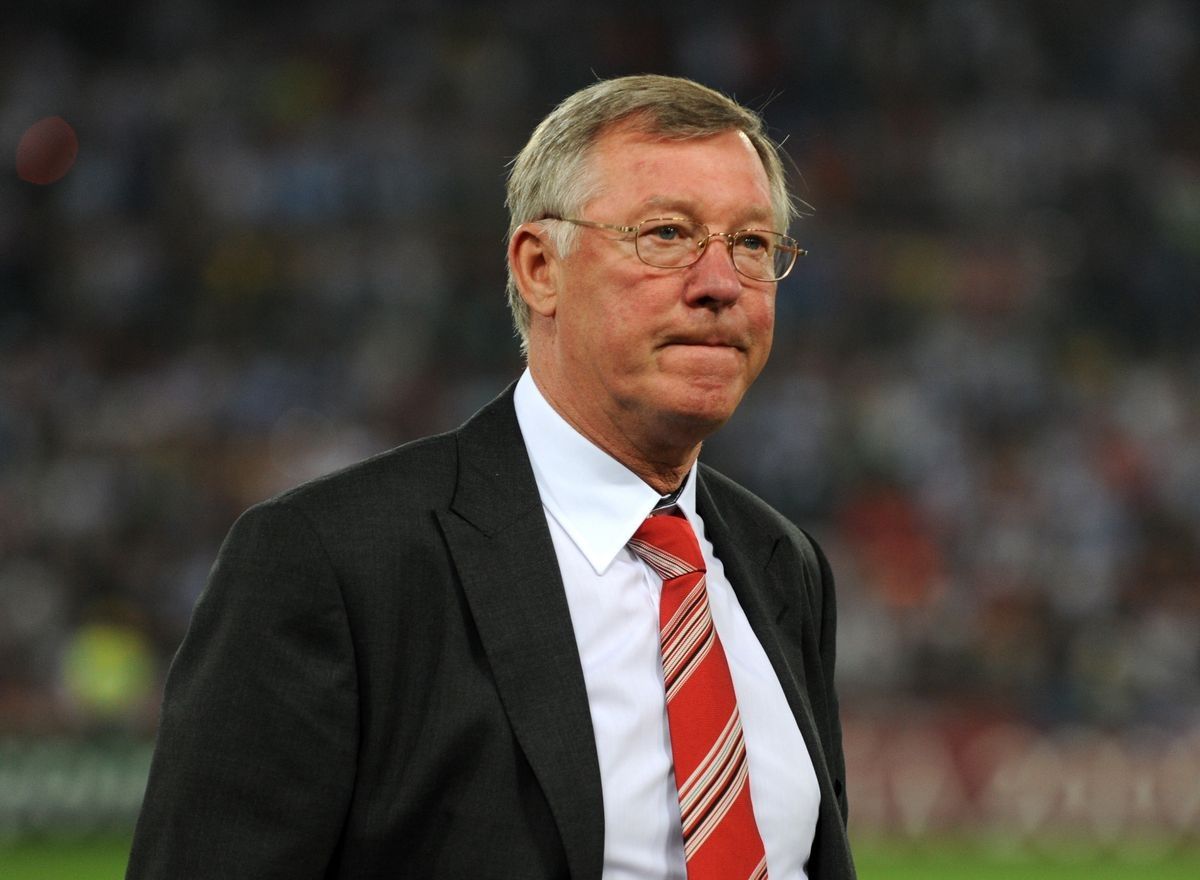The Sir Alex Ferguson Era: Manchester United's Golden Years
Alex Ferguson is without a doubt one of the greatest managers in football history. His legacy as one of the greatest managers in football history will endure for generations to come.

I. Introduction
Alex Ferguson is a former Scottish football player and manager who is widely considered one of the greatest managers in football history. He demonstrated numerous of qualities through the years.
Longevity and consistency- Ferguson's tenure at Manchester United lasted for 26 years, during which he consistently led the club to success. He won 38 trophies in total, including 13 Premier League titles, 5 FA Cups, and 2 Champions League titles.
Ability to build and rebuild teams - Ferguson was known for his ability to build and rebuild teams that could consistently compete at the highest level. He was able to bring through a number of young players from the club's academy and also made astute signings that would go on to become club legends.
Tactical astuteness- Ferguson was a master tactician who was able to adapt his tactics to suit different opponents and situations. He was known for his ability to change formations and game plans during matches to gain an advantage over his opponents.
Man-management skills- Ferguson was a master of man-management and was able to get the best out of his players. He was known for his ability to motivate and inspire his players to perform at their best, and was also able to handle difficult personalities and egos.
II. Early Life and Career
Alex Ferguson was born on December 31, 1941, in Glasgow, Scotland. He grew up in a working-class family and played football from a young age. Ferguson started his youth career at Queen's Park and then moved on to play for several other Scottish clubs, including St. Johnstone, Dunfermline Athletic, Rangers, and Falkirk.
Ferguson began his coaching career in 1974, when he was appointed as the manager of East Stirlingshire. He spent only a brief time at the club before moving on to St. Mirren, where he helped the team win the Scottish First Division title in 1977.
In 1978, Ferguson moved to Aberdeen, where he became one of the most successful managers in the club's history. Ferguson's success at Aberdeen was remarkable, as he managed to break the Old Firm's stranglehold on Scottish football, and establish Aberdeen as one of the top clubs in the country. During his time at Aberdeen, Alex Ferguson led the team to one of their greatest achievements in European competition. In the 1982-83 season, they won the European Cup Winners' Cup, which was their first major European trophy. Aberdeen defeated Real Madrid 2-1 in the final, with goals from Eric Black and John Hewitt. This victory was considered a massive upset at the time, as Real Madrid were one of the most successful clubs in European football history.
Ferguson's success with Aberdeen in Europe continued, as they reached the quarter-finals of the European Cup in the 1983-84 and 1984-85 seasons. They also won the Scottish Cup three times and the Scottish League Cup four times during Ferguson's tenure. His success with Aberdeen caught the attention of Manchester United, who were struggling at the time and were in need of a new manager to turn the team's fortunes around.
III. Legendary Career at Manchester United
Premier League
In 1986, Ferguson was appointed manager of Manchester United, one of the biggest football clubs in the world. He immediately set about rebuilding the team and creating a winning culture at the club. In his first few years, he faced some setbacks and criticism, but he persevered and eventually led the team to their first league title in 26 years in 1993. This was just the beginning of the club's domination in the Premier League in the years to come.
Throughout the 1990s and early 2000s, Ferguson's Manchester United teams were the most dominant force in English football. They won the Premier League title six times in eight seasons from 1993 to 2001, establishing themselves as the team to beat in English football. During this period, Manchester United also achieved the unprecedented feat of winning the treble in 1999, which consisted of the Premier League, the FA Cup, and the UEFA Champions League.
However, the 2000s also saw a period of drought for Manchester United, with the club failing to win the Premier League title for four consecutive seasons. But Ferguson was determined to turn things around, and in 2007, he led Manchester United to their first Premier League title in four years. This victory was just the start of another era of dominance for Manchester United under Ferguson. The club went on to win the Premier League title five more times under his leadership, including three consecutive titles from 2007 to 2009. In total, Ferguson won the Premier League title 13 times as Manchester United manager, which is a record for an English manager.
Domestic Cups
Alex Ferguson’s domestic cup success is also a major part of his legendary career. He won the FA Cup five times and the League Cup four times with Manchester United. His first FA Cup win came in 1990, which was Manchester United's first major trophy in four years. He won the FA Cup again in 1994, 1996, 1999, and 2004. His four League Cup wins came in 1992, 2006, 2009, and 2010.
Ferguson's success in domestic cups demonstrated his ability to rotate his squad effectively and ensure that his team remained competitive in multiple competitions. He often used the domestic cups to give younger players or fringe players an opportunity to showcase their talents and gain experience. This approach allowed him to keep his players fresh and motivated, while also giving opportunities for young players to develop and contribute to the team's success.
One of the most memorable moments of Ferguson's domestic cup success came in the 1999 FA Cup semi-final against Arsenal. Manchester United went a goal down early in the game but equalized late in the second half. The game went to extra time, and in the dying moments, Ryan Giggs scored one of the most famous goals in FA Cup history, dribbling past several Arsenal players before slotting the ball past the goalkeeper.
The Champions League
Alex Ferguson’s success in the Champions League, Europe’s premier club competition, is another testament to his managerial greatness. He won his first Champions League title in 1999, in what is widely regarded as one of the greatest comebacks in the history of the competition. Manchester United were facing Bayern Munich in the final, and were trailing 1-0 as the game entered injury time. However, two late goals from Teddy Sheringham and Ole Gunnar Solskjaer secured a stunning 2-1 victory for United.
Ferguson’s second Champions League triumph came in 2008, as Manchester United defeated Chelsea in a dramatic penalty shootout. After a 1-1 draw in normal time, the match went to penalties, and United goalkeeper Edwin van der Sar made a crucial save to deny Nicolas Anelka and secure the trophy for United.
In addition to his two Champions League wins, Ferguson led Manchester United to two other Champions League finals during his tenure. In 2009, they were beaten 2-0 by Barcelona in the final, while in 2011 they were defeated 3-1 by the same scoreline by the same opposition. Despite these losses, Ferguson’s success in Europe’s premier club competition cemented his place among the all-time great managers.
IV. Management Style and Philosophy
Alex Ferguson's ability to build successful teams was a crucial factor in his legendary career at Manchester United. He was able to develop a youth system that produced many top players, including the famous "Class of '92" which featured David Beckham, Ryan Giggs, Paul Scholes, Nicky Butt, and the Neville brothers. These players became the core of Manchester United's success in the late 1990s and early 2000s, winning numerous Premier League titles, FA Cups, and the Champions League.
Ferguson's approach to building successful teams also involved a mix of youth and experience. He was not afraid to bring in key players through transfers, such as Eric Cantona, Roy Keane, and Cristiano Ronaldo, who played critical roles in Manchester United's success. Ferguson was also known for his ability to create a strong team culture and chemistry, which was crucial in building a winning mentality within the team.
One of Ferguson's most impressive feats was his ability to rebuild Manchester United after major departures, such as that of Eric Cantona and David Beckham. He was able to replace these key players with new talent, such as Wayne Rooney and Cristiano Ronaldo, and continue to maintain the team's success.
Alex Ferguson was known for his use of sports psychology and motivational tactics to get the best out of his players. He believed in the power of positive thinking and encouraged his players to visualize success. He was also known to use pre-match team talks to inspire his players and get them fired up for important matches. He was a master of man-management and was able to get the best out of each individual player. He understood the importance of communication and was known to have a close relationship with his players. He also had a keen eye for identifying talent and was able to bring in players who fit into his team's playing style.
One of his most famous motivational tactics was the "hairdryer treatment". This involved Ferguson giving a player a stern and intense dressing down in the dressing room after a poor performance. It was said that the force of his words could blow a player's hair back like a hairdryer. While this approach may seem harsh, many players have spoken about how it motivated them to work harder and improve their performance.
Ferguson also believed in the importance of mental toughness and resilience. He encouraged his players to never give up and to always believe that they could win, even when the odds were against them. This approach was evident in many of Manchester United's famous comebacks, such as the 1999 Champions League final where they scored two goals in injury time to win the match.
V. Retirement and Legacy
After a legendary 26-year tenure as manager of Manchester United, Alex Ferguson announced his retirement on May 8, 2013. His last match in charge was on May 12, 2013, a 5-5 draw with West Bromwich Albion. His retirement marked the end of an era for Manchester United, and it was a moment that was felt across the football world. Since Alex Ferguson's retirement, Manchester United were not able even to challenge for the Premier League title.
Alex Ferguson's legacy as one of the greatest managers in football history is secure. His record of 13 Premier League titles, five FA Cups, four League Cups, and two Champions League titles is remarkable. He is also remembered for his ability to build successful teams, his use of sports psychology and motivational tactics, and his unwavering commitment to Manchester United.
Perhaps his greatest achievement, however, was his ability to adapt and evolve with the changing times. Ferguson was known for his willingness to embrace new ideas and new technologies, and he was constantly seeking ways to improve his team and his own abilities as a manager.
After retiring as manager of Manchester United, Alex Ferguson turned his attention to philanthropic and community work. In 2013, he launched the Alex Ferguson Foundation, which provides financial support to charities and community organizations around the world. He has also been involved in a number of other charitable initiatives, including the Manchester United Foundation and the Queen Elizabeth II Trust.
VI. Sir Alex Ferguson
"Becoming a Sir" is a title given to individuals in the United Kingdom who have been recognized for their significant contributions to their field of work or society as a whole. It is an honorific title awarded by the monarch on the advice of the Prime Minister.
In the case of Sir Alex Ferguson, he was knighted by Queen Elizabeth II in 1999 in recognition of his services to football. This was a significant honor, as it acknowledged not just his success as a manager but also his contributions to the sport more broadly.
The title "Sir" is a symbol of respect and achievement, and it can have a significant impact on an individual's reputation and public profile. For Alex Ferguson, it further solidified his status as a legend in the world of football, and it helped to raise his profile even further.
Overall, becoming a Sir is a significant honor and recognition of an individual's contributions to society. For Alex Ferguson, it was a testament to his immense achievements as a football manager, and it further cemented his place in history as one of the greatest to have ever coached the sport.
VII. Conclusion
Alex Ferguson is without a doubt one of the greatest managers in football history. His legacy as one of the greatest managers in football history will endure for generations to come. He revolutionized the sport with his innovative approach to tactics and man management, while his incredible success with both Aberdeen and Manchester United solidified his place in football history.

